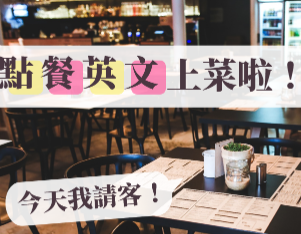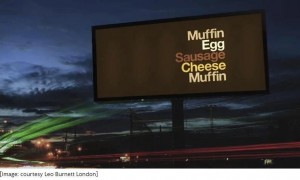Laura 去美国找老朋友 Dennis,因为工作关系,许久未见的两人决定找一间义式餐馆吃顿饭、叙叙旧…
Server: Welcome to Franco’s. How many people are in your party?
服务生:欢迎光临 Franco 义式餐厅。你们有几位呢?
Dennis: There are two of us.
Dennis:两位。
Server: this way, please.
服务生:请跟我来。
(The server guided Dennis and Laura toward a table by the window.)
(服务生带 Dennis 和 Laura 到靠窗的座位。)
Server: Here are the menus. have you visited before, or is this is your first time?
服务生:这边是菜单。两位有来过吗?还是是第一次来呢?
Dennis: It’s our first time. What do you recommend?
Dennis:我们第一次来,有什么推荐的吗?

Server: Well, our signature dish is pesto chicken risotto and today’s special is salmon alfredo pasta.
服务生:我们的招牌菜是青酱鸡肉炖饭,今日特餐则是白酱鲑鱼义大利面。
Dennis: Sounds great! I’ll have the salmon alfredo pasta and a salad.
Dennis:听起来很不错!我要白酱鲑鱼义大利面和一份沙拉。
Server: What kind of dressing would you like on your salad? We have Caesar, honey mustard, and ranch.
服务生:您的沙拉要哪种沾酱?我们有凯萨沙拉酱、蜂蜜芥末酱、田园沙拉酱。
Dennis: I’ll have honey mustard, and I’d like the dressing on the side.
Dennis:我要蜂蜜芥末酱,沾酱请帮我另外放。
Laura: And I’d like the pesto chicken risotto without onions.
Laura:那我要一份青酱鸡肉炖饭,不加洋葱。
Server: Sure. I’ll be back with your order.
服务生:好的。我等一下就为您送上餐点。
Table of Contents
How many people are in your party? 你们有几位?
signature dish (n.) 招牌菜
today’s special (n.) 今日特餐
dressing (n.) 调味酱
on the side (phr.) 另外放
I’m full. 我吃饱了。
must-try (n.) 必吃的 (食物)
have room for sth. (phr.) 还吃得下…
service charge (n.) 服务费
It’s on me. 我请客。
How many people are in your party? 你们有几位?
这边的 party 不是指派对,而是指你们这一「方;群」,有时服务生也会直接问:How many people?。
A: Good evening. How many people are in your party?
B: There are eight of us.
A:晚安,请问你们有几位?
B:我们有八位。
signature dish (n.) 招牌菜
signature 原本的意思是「签名」,因为每个人的签名都富有个人特色,就像是自己的招牌一样,所以 signature dish 就是指餐厅的「招牌菜」。
Our signature dish is pesto penne pasta with smoked chicken.
我们的招牌菜是青酱熏鸡鼻管面。
today’s special (n.) 今日特餐
special 当形容词是「特别的、特殊的」,在这边是当名词,表示「特餐」,因此 today’s special 就是指「今日特餐」,而 today’s soup 则是「今日汤品」。
What is today’s special?
你们的今日特餐是什么?
dressing (n.) 调味酱
dressing 通常是指加在沙拉里面的「调味酱」,像是我们常听到的凯萨酱 (Caesar dressing) 或千岛酱 (thousand island dressing)。
This dressing has a strong aftertaste.
这个酱料的后味很强烈。
on the side (phr.) 另外放
side 的意思是「一旁;一边」,意思就是把食物或酱料「另外放」。
I’ll have small fries with some ketchup on the side.
我要一份小薯,番茄酱另外放。
Laura 和 Dennis 边聊大学时代的趣事边用餐,差不多用完餐后,服务生走了过来。
Server: Would you like something for dessert?
服务生:两位想要来点甜点吗?
Dennis: No, I’m full.
Dennis:不用,我饱了。
Laura: I’ve heard that your tiramisu is a must-try
Laura:我听说来到你们餐厅一定要吃提拉米苏。
Dennis: Really? I always have room for tiramisu. Please bring us two pieces of tiramisu!
Dennis:真假?我再怎么饱都吃得下提拉米苏。来两份提拉米苏吧!
Server: I’ll be right back with your desserts.
服务生:我马上为您送上甜点。
(After they had the desserts.)
(吃完甜点后。)
Server: Would you like anything else?
服务生:你们还需要来些什么吗?
Dennis: No, thanks. We’re totally stuffed.
Dennis:不,谢谢。我们真的撑到不行了。
Laura: Could we have the check?
Laura:我们想结帐了。
Server: Your total comes to $60.52, including a 10% service charge. How would you like to pay? Cash or card?
服务生:加上一成服务费,一共是 60.52 美元。您要刷卡还是付现呢?
Dennis: By card, please.
Dennis:刷卡,谢谢。
Laura: Oh, let’s pay the bill separately.
Laura:噢,我们分开付吧。
Dennis: No. Laura. You got it last time. It’s on me this time.
Dennis:不,Laura,妳上次付过了啦,这次我请客。
I’m full. 我吃饱了。
full 常常用来形容「满的;全部的;完整的」,所以 I’m full. 的意思就是「我吃饱了」。另外也可以用 stuffed (塞满的) 这个形容词来表达相同意思。
Grandma: You should eat more. You’re too skinny.
Linda: But Granny, I’ve had five bowls of noodles. I’m full!
外婆:妳应该多吃点,你太瘦了。
Linda:奶奶,我已经吃五碗面了,我饱了啦!
must-try (n.) 必吃的 (食物)
这个字很好理解,must 的意思是「必须」,而 eat 是「吃」,所以 must-eat 就是「必吃的 (食物)」。以此类推类似用法的字还有:must-go (必去的地方)、must-read (必看的书籍)、must-see (必看的东西)。这些字都可以当名词也可以当形容词用。
The video introduces you to ten must-try local cuisines in Prague.
这支影片介绍了去布拉格必吃的 10 种当地菜肴。
have room for sth. (phr.) 还吃得下…
room 常见的意思是「房间」,在这边则是不可数名词,表示「空间」,片语 have room for sth. 是指「还有…的空间」,若受词是食物,那就是指「还吃得下某食物」的意思。
No matter how full Mary is, she always has room for dessert.
不管 Mary 吃得多饱,她一定都吃得下甜点。
service charge (n.) 服务费
service 为名词,表「服务」,charge 在这边也是名词,意思是「费用」。许多餐厅都会收服务费,也就是 service charge,也可以用 service fee 表示相同意思。
Your total comes to $33.00 , including a $3.00 service charge.
包含 3 美元服务费,总共是 33 美元。
It’s on me. 我请客。
It’s on me. 是指帐单算在我身上,也就是「我请客」的意思。补充,Let me get this.、It’s my treat. 也都是类似的意思。补充:split the bill (分摊)、pay the bill separately (分开付)。
A: Just order whatever you want to eat. It’s on me!
B: No, you got it last time. Now it’s my turn to pay.
C: Stop! Let’s just split the bill!
A:想吃的就尽管点,这顿我请!
B:妳上次已经请过了啦,这次换我请
C:别吵了!我们就平摊吧!







